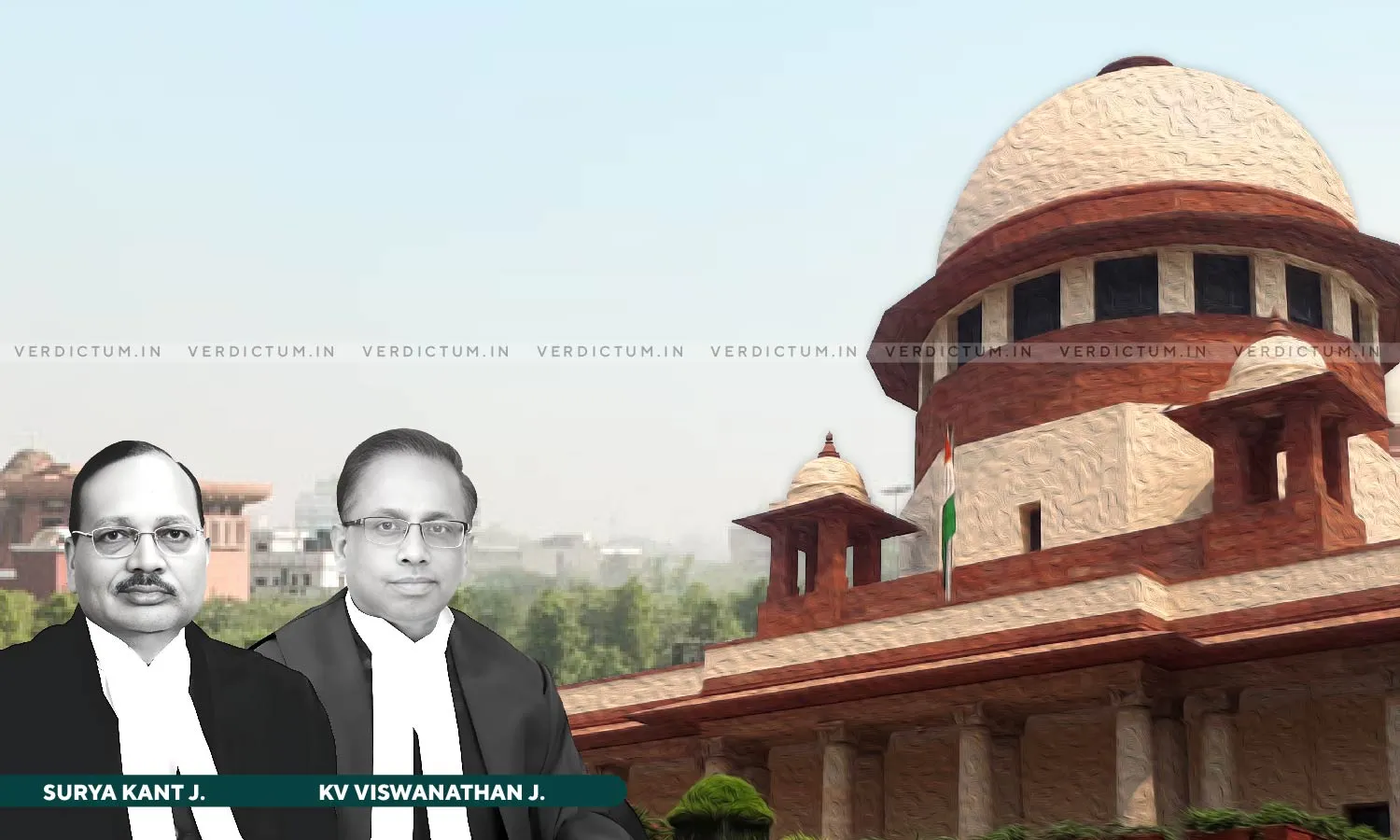Reversal Of Small Pockets Of Land In Some Cases Might Be Impossible As They May Lie In Middle Of Large Development Projects: SC
The Supreme Court remarked that in some cases, reversal of small pockets of land might be impossible since they may lie in the middle of large development projects.
The Court was dealing with a batch of civil appeals preferred by New Okhla Industrial Development Authority (NOIDA) against the judgment of the Allahabad High Court by which the land acquisition proceedings were annulled by quashing the declaration issued under Section 6(1) of the Land Acquisition Act, 1894 (LA Act).
The two-Judge Bench of Justice Surya Kant and Justice K.V. Viswanathan said, “Accepting the respondents’ claim would require turning back the clock, which would adversely impact the larger public interest. In some cases, reversal of small pockets of land might be impossible also since they may lie in the middle of large development projects. In such peculiar circumstances, even if we accept that a handful of respondents did not get a fair enquiry under Section 5A, the same may not be a sufficient ground to annul the acquisition process as substantial compliance has already been made.”
The Bench noted that the person who submits objections under Section 5A of LA Act must be accorded an opportunity of personal hearing and such a hearing must precede with an advance notice served upon the objector.
Senior Advocate Ravindra Kumar represented the appellant, AAG Ravindra Kumar represented the State while Senior Advocate Dhruv Mehta, Advocates Rajeev Sharma, Jasbir Singh Malik, Smarhar Singh, Rahul Sharma, and Jaikriti S. Jadeja represented the respondents.
Facts of the Case -
A notification under Section 4(1) of the LA Act was issued for the acquisition of land situated in a village. The acquisition was intended for the “Planned Industrial Development in Gautam Budh Nagar” by NOIDA. The notification was published in the State Gazette and in daily newspapers and additionally, a public announcement (munadi) was conducted. Through such mechanism, the persons interested were invited and allowed to lodge their objections, if any, against the proposed acquisition. The respondent filed his objections under Section 5A of LA Act before the Collector and submitted that his land was in ‘abadi’ area and thus ought to be excluded from the acquisition process as per policy decision of the State Government.
The respondent further stated that his land was used for cattle rearing and he had his farm buildings constructed and such acquisition would not only jeopardize his means of livelihood but also render him homeless. Most of the other land-owners also objected to the acquisition of their lands primarily on the ground that such lands fell within ‘abadi deh’. The Collector dismissed the objections and submitted a report, recommending for acquiring the subject land. Being aggrieved, the respondent approached the High Court and it quashed the notification. As a result, NOIDA challenged such decision before the Supreme Court.
The Apex Court in view of the above facts observed, “As a necessary corollary, the failure to serve the notice would be sufficient to infer the defiance of Section 5A of the 1894 Act. Consequently, the acquisition process would be liable to be hammered. … The rule of statutory presumption is a well rooted principle in Common Law and founded upon the dictum ‘omnia praesumuntur rite esse acta’, namely, that the act can be presumed to have been rightly and regularly done. The Court would presume that the official act was done rightly and effectively and the burden to prove contrary lies on the party who disputes the sanctity of such act. The High Court unfortunately misconstrued this legal proposition while observing that there should be a presumption regarding notices not being served on the respondents.”
The Court emphasised that the onus thus lay on the landowners to demonstrate that the issuance or service of notices was inefficacious and in the absence of any allegation of mala fide exercise of power, the vague and overly broad claim of being unaware of the acquisition proceedings taken by the respondents during the course of hearing cannot be countenanced.
“This is especially noteworthy that only a small fraction of landowners have contested the acquisition, with nearly 90% not objecting to the proceedings. We are thus satisfied that the proceedings carried out under Section 5A ought not to have been set at nought on this ground”, it added.
The Court further said that the High Court erroneously held that the objections were disposed of cryptically merely because they were grouped and had the respondents substantiated that the consolidation was done arbitrarily, impairing the fairness in adjudication, then only it could be said that each objection ought to have been dealt with separately.
“It appears that the only purpose of the corrigendum was to bring further clarity into the ongoing process and not to tinker with the merits of the objections. There is nothing in the contents of the corrigendum to draw adverse inference or doubt the fairness of the procedure followed for deciding the objections”, it concluded.
Accordingly, the Supreme Court allowed the appeals, set aside the impugned judgment, and directed the payment of compensation to the respondents and other land owners within 4 weeks.
Cause Title- New Okhla Industrial Development Authority v. Darshan Lal Bohra & Ors. (Neutral Citation: 2024 INSC 508)




